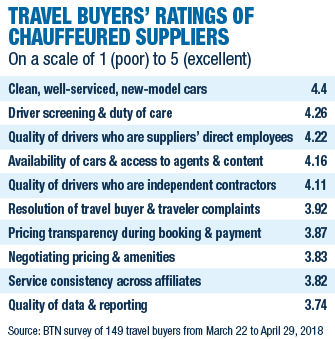
Ground transportation suppliers are delivering in terms of safety, vehicles and drivers. Data quality and service consistency, though, show room for improvement. Buyers rated their chauffeured suppliers ability to deliver clean, well-serviced, new-model cars the highest among all criteria: 4.4 out of 5. Driver screening and duty of care was second. Buyers showed the lowest levels of satisfaction with the ability to negotiate pricing and amenities; service consistency across affiliate networks; and the quality of data and reporting.
Pharmaceutical Strategies Group corporate travel and meetings manager Jennifer Brown uses a traditional chauffeured supplier around the Dallas-Fort Worth area, and it performs well across all criteria. “We’ve used them for a number of years, and they’ve given us very consistent service and duty of care,” she said. “All their drivers are drug-tested, and they track our travelers’ flights so they stay in contact with travelers if there are issues or flight delays.”
Her travelers also use ride-hailing apps, though PSG’s policy does not directly encourage that. A majority of travel buyers reported the same. So far, Brown has eschewed ride-hailing apps’ managed travel offerings, such as Uber for Business, as she remains “a little concerned with safety and security.”
The ground transportation industry is largely divided among two sets of demands, Blacklane CEO and co-founder Jens Wohltorf said. “You have cleanliness, duty of care and driver quality, which professional chauffeured services were made for,” he said. “You also have agility, ease of booking, global accessibility and the technology-driven topics, which you’ll find with totally different players. The first world has a hard time delivering on the second part, and the second world has a hard time delivering on the first.”
Suppliers on both sides are working to bridge those gaps. Uber, for example, has pledged to add new safety features to its app this summer, including not only the ability for travelers to share trip details with trusted contacts but also an emergency button to contact 911. Uber also is increasing background checks on drivers across its system. Lyft, meanwhile, is spending $100 million on hubs so its drivers can better maintain and clean their vehicles.
A few upstarts are tackling those issues head on. One example, Safr, targets women in its marketing for both riders and drivers. It began with safety features like a quick connection to 911 or to contact loved ones and a color-matching system within the app that ensures riders are always getting into the correct cars. The company has launched in Boston, Orlando and Pakistan.
Overall, corporate travel manager hesitance to allow ride-hailing apps has declined, particularly where the largely unmanaged world of taxis was previously used. Only 5 percent outright prohibit their usage, according to BTN’s survey. “When you drill down, [ride-hailing drivers] are probably more vetted than some taxi drivers, at least in some countries,” UCB head of global travel, meetings and fleet management Geert Behets said at the recent Association of Corporate Travel Executives conference. “We feel there is so much movement for the moment that you do not want to limit the travelers.”
Traditional chauffeured suppliers, meanwhile, are building on their offerings from the other side. Blacklane, which has developed a platform for simplified booking and set pricing of traditional chauffeured services, has continued to grow its network in the past year, Wohltorf said. Some longtime players also have entered the on-demand space, including Dav El/BostonCoach parent company Marcou Transportation Group, which last year acquired GroundLink to help develop an on-demand platform, and Carey, which has launched an on-demand Embarque 10&2 service in Boston and San Francisco.
BTN’s survey, however, shows buyers still largely are unaware of or have not had the chance to use the traditional chauffeured services’ on-demand offerings. “They’re more in the beginning stages,” KBB Partners director of travel services Mira Rosenzweig said. “Some of us know about them, but [suppliers] haven’t been aggressively selling them.”
Methodology for BTN’s Chauffeured Service Survey
From March 22 through April 29, 2018, BTN surveyed travel manager and buyer members of the BTN Research Council and a randomly selected subset of qualified subscribers of BTN and Travel Procurement. Equation Research hosted the survey and tabulated the results. In previous years, BTN asked buyers to rate the importance of and their satisfaction with each aspect of their chauffeured service. This year, BTN asked buyers to score their preferred chauffeured providers on a five-point scale.